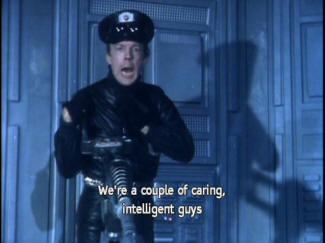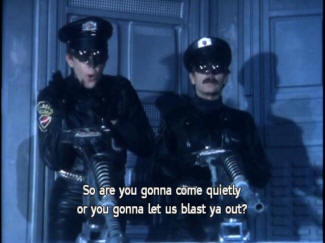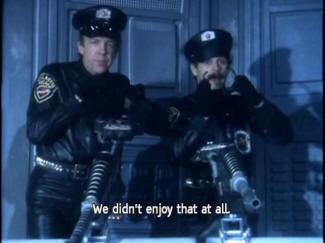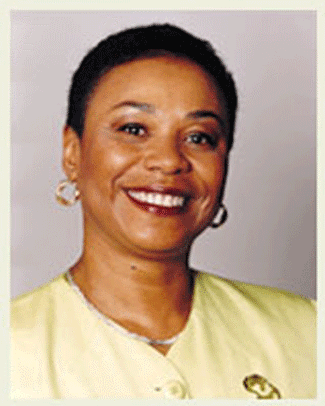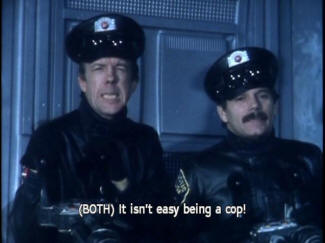
The Hitchhiker's Guide to the Galaxy, by Douglas Adams
Well, for just a minute there during the last week of August, it looked like we might really need cops with guns in Ashland. The Tidings reported a carjacking at gunpoint in the Albertson’s parking lot. Turned out it was just some gal tired of going to work and running out of excuses for flaking out on her boss, so it was just one more Class “C” misdemeanor for filing a false report. She must’ve garnered some sympathy down at APD, though, ‘cause even not returning a video is a Class A Misdemeanor. The only thing lower would be a ticket for smoking pot, but that won’t get you out of going to work, so I can see why she didn’t go there. Oh, Ashland Police Department, how vital to the public good thou art. It’s easy for me to joke, though – I’m not on a watchlist – at least not the one that was circulated to the Chamber of Commerce by Sgt. Selby. I don’t get harassed for jaywalking like the homeless. I didn’t get pushed out of my job as Chief by a cadre of cops who hated my guts.
Mike Bianca did, and the strain of it showed in every fiber of his being as we ate lunch together on the veranda at Pilaf, overlooking lively Guanajuato Way and noisy Lithia Creek. He looked very different from how he had in years past, when he was healthy, vibrant and full of good cheer. I had seen the stress building since he took the job as Chief, but in the bright summer sun, I could see a dark tinge had crept into his features, lines of pain were etched around his eyes, and the skin had drawn taut over his brows, cheekbones and jaw. Something very bad had happened to this man.
In 2002, Bianca had spent seventeen years on the force “as an outsider … not being one of the boys, and viewed as a bit of an oddball.” He had made Sgt. Under Vic Lively, the Chief who retired in 1991. So perhaps it was surprising to some within the department when Bianca sought the Chief’s position, left vacant by Scott Fleuter, who had the job from 1996-2002. Certainly it was a disappointment to Rich Walch, who held the position of Interim Chief, after Fleuter’s departure, but didn’t apply for the Chief’s position. Bianca felt he could do the job, and expected to receive at least the level of respect the rank and file officers had shown for Gary Brown, the Chief from 1991-1995, between Lively and Fleuter. Brown, who had dressed the force in grey uniforms that they hated, and fostered an attitude of sensitivity that was derided by police insiders as “hug and release.” Bianca observed that Brown had been a “conflict-reducer” who “blurred the lines between management and union and cut off APD from the larger law enforcement community.” In retrospect, Brown’s policy of forcing APD officers to march to a more sensitive beat may well have been a shrewd move. He, after all, was not ousted by his own officers. Brown also profited by the contrast with his predecessor, Vic Lively, who had been an old-school cop with a penchant for doing things his way, the police union be damned.
Bianca caught a pendulum swinging in the other direction. His predecessor, Scott Fleuter, had successfully shaped the APD attitude into the one that some people complain about – “professionalism.” In practice, professional police are scary, and for a reason. Bianca summed up his perception of how your average patrol cop has been trained to think: “There is so much fear in policing. Everybody’s going to kill them all the time. We whipsaw our police officers … they think they need machine guns and armored cars because they’re fighting terrorism and drug dealers who have them. I never thought we were fighting a war on drugs or terrorism. I felt we were serving the community. That kind of jive was lost on me twenty years ago. We’re not making war on our own people. That’s the most ridiculous thing I’ve ever heard.”
As Bianca put it, the upside of Fleuter’s tenure was getting a Federal grant for mobile computers and plugging into the larger law enforcement network. The downside was that an arrogant attitude infected the department: “We’re the cops. We’re better than you. We’ll do it our way.”
Another development fed the atmosphere of self-glorifying paranoia at APD – the Columbine effect. Police had been utterly ineffectual during the one-sided firefest that Klebold and Harris unleashed on their fellow students before they killed each other. In Ashland, and all over the country, masses of kids were suddenly viewed as bands of potential homicide perpetrators. School administrators and some parents demanded assurances that “it won’t happen here,” noting that Columbine, too, was a nice mountain town full of white people with fat incomes and children with high SAT scores.
The entire law enforcement universe, of course, got a jolt from the destruction of Larry Silverstein’s World Trade Center buildings and Building Seven, by a mysterious series of explosions that detonated the three structures shortly after a pair of jetliners smacked in buildings one and two. Police did nothing of importance during or after this event, allowed all of the evidence to be destroyed, allowed all the Saudis left alive in the country to leave without being asked any questions about why the other Saudis had crashed those planes into Silverstein’s buildings. Nevertheless, police found plenty of new reasons to be spooked by the terrorist menace, and reason to hope that the wave of fear sweeping the nation would put civil rights back in their rightful place – on a little card in a cop’s wallet. The President abolished all types of criminal laws intended to put the burden of proving guilt on the government, declaring that at his word, a man could be called a “terrorist” or an “enemy combatant,” and be forced to spend years in prison without charges, without a lawyer, without a judge. Torture came back into vogue, the Geneva conventions were deemed quaint, and Congress signed something called the PATRIOT Act, all in a hurry to experiment with the new concept of being statesmen in time of war.
Into this atmosphere came Chief Bianca, a man plain-spoken enough to share his deeper musings, honest enough to admit that Ashland policing could be a bit dull for cops in search of “action,” and trusting enough to think his fellow cops would give him a fair shake. Bad move on all three counts. Better he should have spouted lines by Sgt. Joe Friday, spoken ominously about gangs and drugs, and fired every person on the force who wouldn’t come to his barbecues. Then, he would still be in office, and the police union would be complaining about how cops are entitled to free speech, too. Which would be a hoot.
But that Machiavellian strategy would not have served Chief Bianca’s purpose, which was to protect Ashland from the wave of repression that the law enforcement cultists were actively promoting around the country. With money, training, databases, task forces, and fear-mongering propaganda, the federalization of law enforcement continues to be a threat to the freedom of every American. Mayor Potter has fought a mighty battle in Portland to get the FBI out of the Portland Police Bureau, and has even discovered FBI informants in city government. Portland, you will recall, is where the USDOJ put an Oregon lawyer, Brandon Mayfield under secret arrest for over a week after the FBI searched his home office with Patriot Act warrants, accusing him of being a terrorist in league with the Madrid train bombers, who had, in addition, a Muslim wife who had once made a phone call to Pete Seda, the Ashland peace activist. Perhaps you think I overstate the matter, but I was there when Chief Bianca took the microphone last year during Free Speech in the Park Day and told everyone assembled there that, if they were worried “about secret searches and people being taken from their homes in the night,” that we didn’t have to fear them as long as he was Chief of Police in Ashland. I for one slept better that night, and I believe it was what he was fighting for.
But the war one is fighting and the battle in which one is defeated are two different things. By the time he resigned this summer, many of us thought that Bianca’s hour of crisis had passed. In fact, the toxic brew of hatred for him became the meal du jour at APD for a clique of managers, led by Dep. Chief Rich Walsh, Sgt. . Selby, and Gail Rosenberg, a civilian training manager. Their strategy was to undermine Bianca’s authority by all means necessary. Keeping him out of the loop, deliberately neglecting his policing priorities, and going over his head to complain to City Administrator Gino Grimaldi and Mayor Morrison.
First, why would Sgt. Selby hate Chief Bianca? It might be temperamental. Sgt. Selby is a grim woman. Last time I saw her we met inside the police station, where I was trying to get some police records about Terry Carr, the Hollywood director who disappeared from Ashland Market of Choice last year with his little girl, and they both turned up dead in Clearlake, California the next afternoon. Naturally, the APD refused to produce the full police report, and after I had taken all the lip I needed from the clerk, she called Sgt. Selby to deal with my intransigent ass. I’ve known Selby since I was a Deputy D.A. in 1994, and I still haven’t seen her smile. A little tiny turn up at the corners of the mouth, maybe once or twice. On this day, she was wearing a bulky bulletproof vest under her uniform, and when we met, she declined to proceed informally, directing me to enter the conference room as if it were a jail cell and she were about to lock me in. In the room, she remained standing, and promised to help me get the documents. Thereafter, she did nothing of the sort, failed to answer my email, and when I got her on the phone, blandly told me that she wasn’t going to help me at all. So, she lies.
She has also had health problems, which for a police employee, can provide some latitude for the independent type. Police retire on disability at much higher rates, and with much greater ease, than the rest of us. In fact, up in Portland, there are so many disabled cops they’re trying to get ‘em back in the office to answer phones or fetch donuts. But that’s generalizing, and in Sgt. Selby’s case, the sick leave thing had become a specific problem, and Chief Bianca had sent her a letter telling her that she’s just have to show up to work a little more often. Things didn’t get any better when time came to fill a vacant Lieutenant position. Selby was the only cop with five years supervisory experience, a prerequisite for the job, but instead of giving the job to Selby, he decided to keep it open while he groomed a field of candidates, who would each serve one year as “Master Sergeant,” a training position. Selby was promoted into that job, and spent most of her year at home, convalescing from surgery, and working on “projects.”
Selby evinced no gratitude to her Chief for the long months of accommodation of her illness, and in the summer of 2004 organized the other officers to attend a meeting with City Administrator Gino Grimaldi for undisclosed reasons. Once they were there, some of the officers were told that the purpose of the meeting was to badmouth Chief Bianca behind his back. When Grimaldi expressed support for Bianca, Selby was undeterred. She pushed forward with her campaign to undermine the Chief by riling up the police union, that ultimately issued a “vote of no confidence” in the Chief. She organized a second meeting, with Mayor Morrison, who agreed to hire consultants to identify the problem in the department. That was of course the beginning of the end. The corporate death march had begun, and predictably, when Chief Bianca submitted his forced resignation, Mayor Mike Morrison cited the report submitted by the consultants as the reason for letting him go. The report, said the Mayor, was “a roadmap” that would take the City down the road to “community policing,” and he didn’t have confidence that Chief Bianca could lead us down that road.
Well, the report is on the City website.
Conceivably, of course, if Chief Bianca had not chosen to fire Rick Spence for sexually harassing police recruits, he might have avoided appearing in a tragic role. Based on an internal complaint from a female police officer, Bianca learned and reported to the City Attorney what he believed was a severe charge of misconduct against Spence. As I fished for adjectives to describe Spence’s conduct, suggesting the word used in the media – “hazing--” the look on Bianca’s face suggested he thought the word far too weak. “More like torture,” he followed up, looking deeply troubled.
Bianca made up his mind to fire Spence without first “instituting progressive discipline,” a magic word that means you should paper the file with records of an employee’s misconduct. One little problem. Spence had been a training officer for years, was the go-to guy on graveyard shift, and was looked up to by a lot of the younger officers. Nobody had been papering his file. Bianca observes now that under Spence’s training, new officers went sour on an accelerated schedule. I asked him what he meant, and he explained that while all cops get worn down over time, and enjoy their job less, under Spence’s training, the downward curve was hitting very soon for most of the new Ashland cops.
It is apparent that Bianca didn’t act rashly in deciding to fire Spence without prior discipline – everyone above him supported the decision, including City Attorney Mike Franell, someone with authority from the City’s insurance company, and Mayor Mike Morrison. There were no dissenting voices. Whatever Spence did, it must have been really upsetting to a lot of people, because on any given day firing a cop with a union is something a City official thinks twice about. So it must have been that everyone agreed that it was probably more of a liability risk to the City to keep Spence around than to try and use some progressive discipline. Of course, failing to discipline him at all would be as good as encouraging him in his depredations upon his fellow employees, so that surely wasn’t an option. There might have been some middle ground, but apparently no one wanted to occupy it – Spence was a bad hombre and he had to go now.
But a worm will turn, and with the help of police union lawyers, Spence filed for arbitration. As settlement discussions proceeded, Morrison told Bianca to negotiate directly with Spence’s lawyers. After rejecting Spence’s settlement proposals, Bianca expected the City to back his position, but instead, Morrison and Franell overruled him, and put Spence back on the force. Doesn’t that give you a creepy feeling?
It sure upset Jan Janssen, who abruptly ended her long tenure as a civilian APD employee in protest over the re-hiring of Rick Spence. Known to hundreds of Ashlanders as the probation officer with a heart, she was a pillar of the criminal court system. Before her abrupt resignation, Municipal Judge Alan Drescher had described her as an indispensable person, the one person who addressed the need for social rehabilitation of young people who have run into trouble with the police. In our interview, she was careful not to say too much, but expressed consternation at how her own police union exercised its leverage against Chief Bianca, while simultaneously acting in secret. She did not support the “vote of no confidence,” but was unable to learn how her fellow-union members had voted, or even the final vote-count. After she submitted her resignation, Mayor Morrison asked her to stay, and explained his decision, but she coouldn’t work for a department that would rehire Rick Spence.
Jan said she was looking forward to a new beginning, but I had to ask myself what kind of thinking had driven the City to re-hire a sexual harasser, a torturer, if the Chief’s assessment was fair, at the cost of losing someone as genuinely valuable to our community as Jan Janssen. Why should a nice town like Ashland be constrained to lose a Chief that it wanted, and a probation officer it needed, to keep a cop that everyone in the top levels of City government had agreed should be fired?
Mayor Mike Morrison was just a little bit difficult to get ahold of, but after a couple of calls, he gave me an interview that was very cordial, but not very informative. I asked him about why Rick Spence had been rehired, and he responded that it was “all legal stuff,” and he wasn’t able to discuss it in much detail. Posing a question for my benefit, he asked, “Am I particularly happy that Rick Spence is still in the APD? No.” However, he assured me, “I sleep very comfortably with my decisions.” I ran through the facts that Chief Bianca had shared with me, and the Mayor confirmed that he and City Attorney Mike Franell had all agreed to fire Spence without progressive discipline. So, I asked, why did they bring him back? Morrison said it was like the O.J. Simpson case – the City knew what Spence had done, but Mike Franell didn’t think they could prove it in a court of law. I asked him if he could tell me just what it was that Rick Spence had done that couldn’t be proved in a court of law, but he smiled and said, “that may be a legal matter.” Well of course, but isn’t it strange that it’s a secret from us, the taxpayers who pay Rick Spence’s salary, and have to accept him as a peace officer in our town? Yes, said the Mayor, it was “antithetical to public accountability.” He added to this by saying, “It goes against the grain of me because truthfulness is the basis of public policy.”
So there you have it. Thanks to the two-faced, flip-floppy political atmosphere that prevails at the top of the administrative food chain in Ashland, we have lost a Chief who was popular with the citizens. We have lost Jan Janssen, a much-loved and very effective probation officer. We have retained Teresa Selby, rewarding her for going over her boss’s head and pouring a sob story into the ears of the Mayor. And after taking out the garbage, Mayor Morrison held his nose and brought it right back in by rehiring Rick Spence, whose record would apparently qualify him for a job at Guantanamo. Now Spence, who would apparently be a total loser as a civilian, is back in uniform, driving a car loaded with a computer full of secret data about you and your neighbors, not to mention a shotgun and a TASER. If you meet him, on duty or off, he will probably be carrying a gun. He is getting paid his full salary, and probably got a nice sized check to cover his pain and suffering for being fired, but that is a confidential number that you will not get to learn because you just pay the bills. Unlike you, Spence has the power to stop, question, arrest, even kill his fellow citizens. And while you can’t ask about his personal business, he’s free to pry into yours.
Everybody says you can’t fight City Hall, but in researching this article, I discovered the reverse. City Hall can’t fight the cops. Our Mayor and City Attorney are pushed around by the police union. We will get the kind of policing the police think we should have. Just think about that the next time you see an Ashland cop tailing you. It might be Rick Spence.


